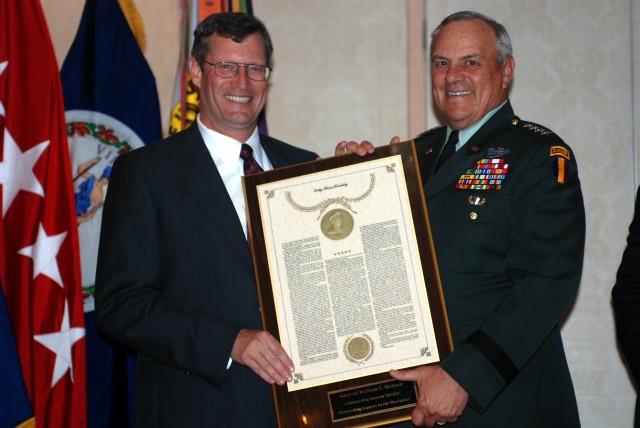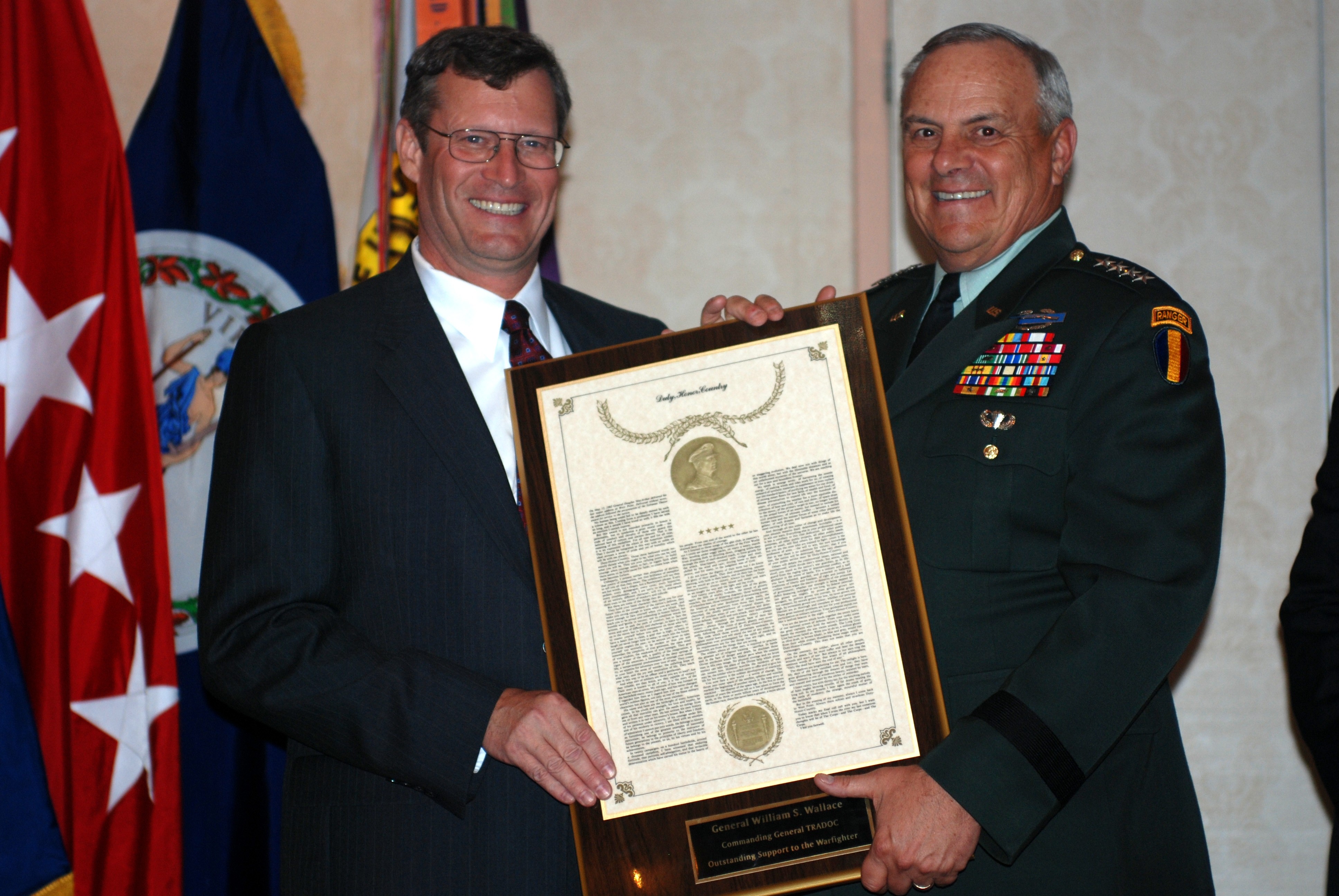Yorktown, Va. (TRADOC News Service, June 5, 2008) - The Virginia Peninsula - Gen. Douglas MacArthur Chapter, Association of the United States Army, presented the MacArthur Award to the Gen. William S. Wallace, the commanding general of the U.S. Army Training and Doctrine Command, at the chapter's Industry Day dinner. The MacArthur Award is given annually to a citizen, military or civilian who has significantly contributed to national defense, the Army, Soldiers, AUSA and the local chapter.
Some of the previous MacArthur award recipients included Gen. William Richardson, Sen. John Warner, Gen. William Hartzog and Gen. Gordon Sullivan.
After receiving the award, Wallace addressed the more than 200 Soldiers, family members, industry leaders and AUSA members.
The general started his address by quoting MacArthur, a former Army Chief of Staff and high-profile commander during WWI, WWII and the Korean conflict. "MacArthur once said a general is just as good or as bad as the troops under his command," said Wallace. "Well, I can tell you with all sincerity and complete humility; I'm damn good!"
The June 4th banquet happened to occur on a special night to Wallace. The night marked the 39th anniversary of the day he was commissioned a 2nd Lieutenant in the U.S. Army after graduating from the U.S. Military Academy at West Point.
The general talked about the character traits of MacArthur. According to Wallace, MacArthur struck the right balance between being a warrior, humanitarian, intellectual, Soldier and Statesman. Those are the character traits the Army is asking of today's Soldiers.
"We are asking our Soldiers to strike a similar balance to be able to prevail in the increasingly complex operational environments we face today and we will continue to face for the next several decades," said Wallace. "Our Soldiers and leaders at every level work in uncertain environments that present highly complex problems requiring innovative and creative thinkers and solutions."
Wallace addressed negative media reports of the Army lowering its standards to maintain recruiting numbers. Enlistment waivers have increased slightly, but the standards on Soldier training and performance haven't waivered in the slightest.
"Army training and standards are more rigorous and comprehensive than ever before," said the general. "I am less concerned about the raw material we receive than I am about the product that we produce.
"Give me any willing, able-bodied young man or woman, let me train them in basic and advanced individual training and continue to develop them through their first enlistment, and whether that person leaves with an honorable discharge after three or thirty years, our Nation will be better for it," said Wallace. "We produce strong, honest, motivated, disciplined citizens who know how to make a difference and work as a team. That is the U.S. Army's contribution to this Nation and that is the Army's commitment to our children and our communities."
The general told the story about the latest recipient of the Congressional Medal of Honor, nineteen-year-old Pfc. Ross A. McGinnis, from Knox, Pa.
As a teenager growing up in rural Pennsylvania, McGinnis got into trouble at age 14. He was expelled from the eighth grade and finished at an alternative school. On his 17th birthday: June 14, 2004, he enlisted in the Army after his recruiting battalion commander granted him a waiver. Once in the Army, McGinnis proved himself a quick learner and showed signs of leadership.
McGinnis was manning a HUMVEE gunner's hatch in December 2006 in Baghdad when an insurgent tossed a grenade from above. It flew past McGinnis and down through the hatch before lodging near the radio. Although he had time to exit the vehicle, McGinnis covered the grenade with his body, pinning it between him and the vehicle, and absorbing most of the explosion when it detonated. His action saved the lives of the four Soldiers riding with him in the vehicle.
"Unfortunately, while some young people may be willing to serve, a declining number are actually qualified and able to serve in our Army," said Wallace. "The alarming trend has the potential to threaten our national security if nothing is done to reverse it.
"Only 28 percent of the 17 to 24 year old population qualifies to wear a military uniform," the general continued. "That means 72 percent don't qualify because they fail to meet minimum standards on education, character or health."
The Army is working to give an opportunity to young men and women who want to serve. It is on the verge of opening the first Army Preparatory School to help non-high school graduates get caught up on fitness while becoming academically-eligible for the military.
"We are taking these steps because we believe they will have a profound impact on educating our nation's youth," said the general.
He talked about the JROTC (Junior Reserve Officer Training Corps) and the NDCC (National Defense Cadet Corps) programs.
"These are proven programs where statistics show that participating students have higher attendance and graduation rates than their peers and they are also exposed to 120 hours of physical activity and leadership assessment training," said Wallace. "Even though most of these kids will go on to careers outside the military, our society as a whole still benefits as their discipline and determination serve them and their country well beyond high school."
As the general closed his message, he spoke of the topic he enjoys talking about; Soldiers.
"I ask each of you to remember that tonight in places like Kandahar and Mosul and Baghdad or hundreds of places around the globe, there is a young American Soldier, walking point for his squad, his battalion, for his Army and his Nation," said Wallace. "On point is a position of great danger and great responsibility. That Soldier's very presence represents opportunity to people who would otherwise have none."


Social Sharing